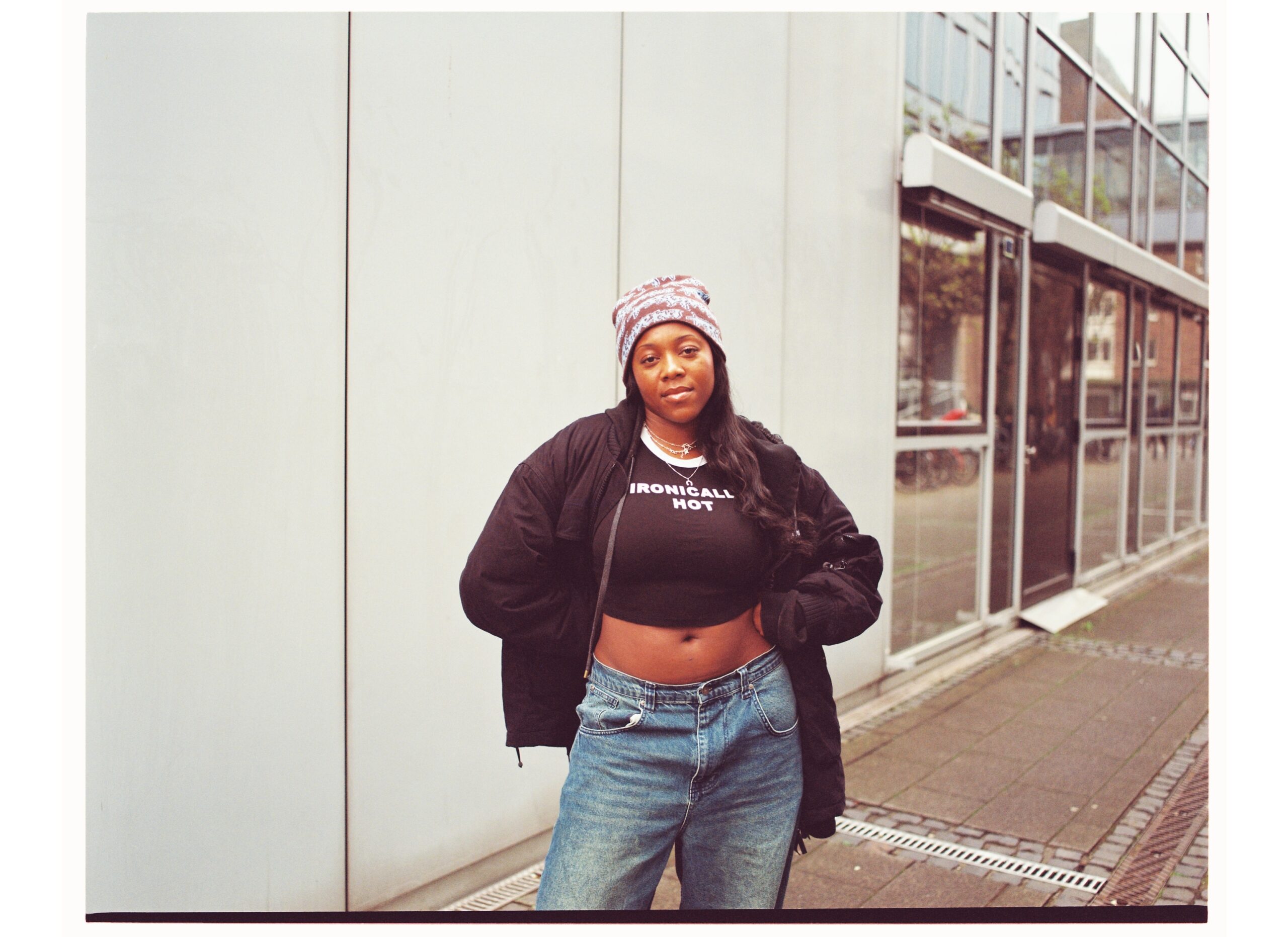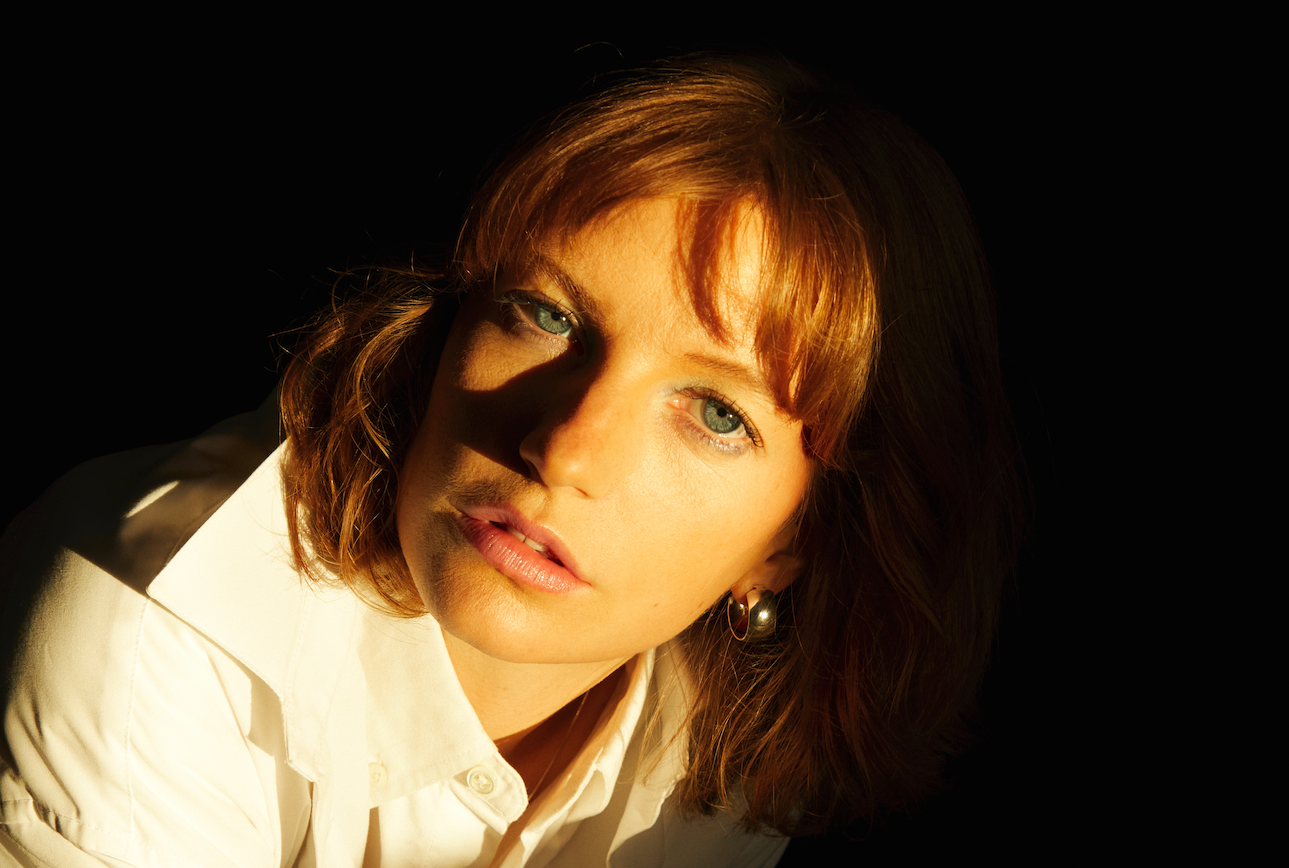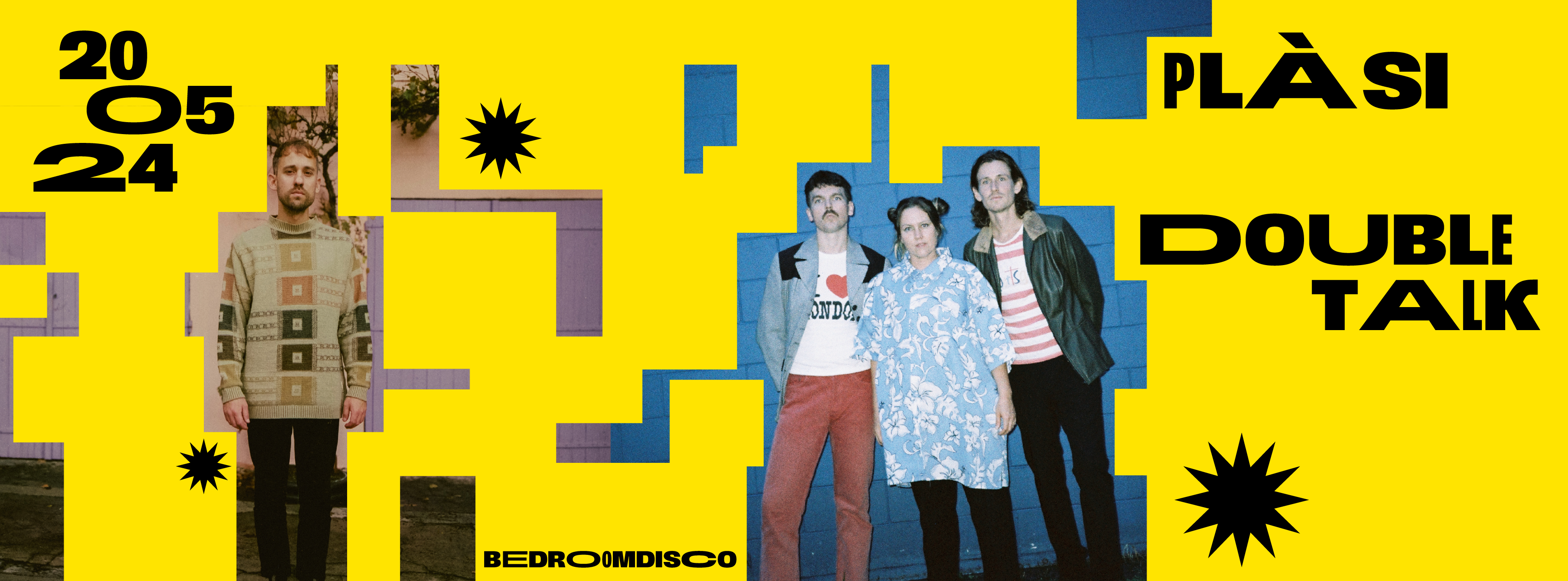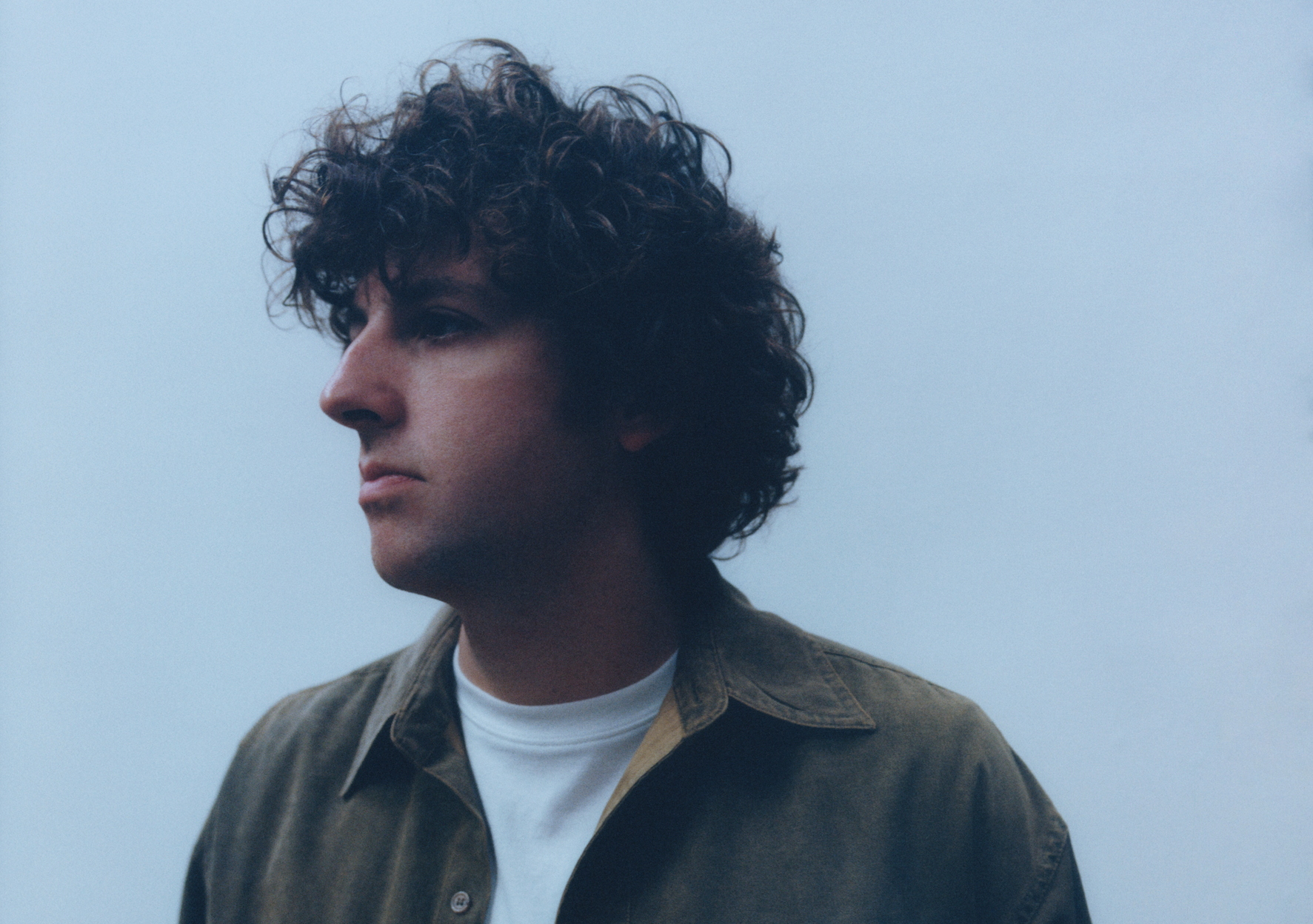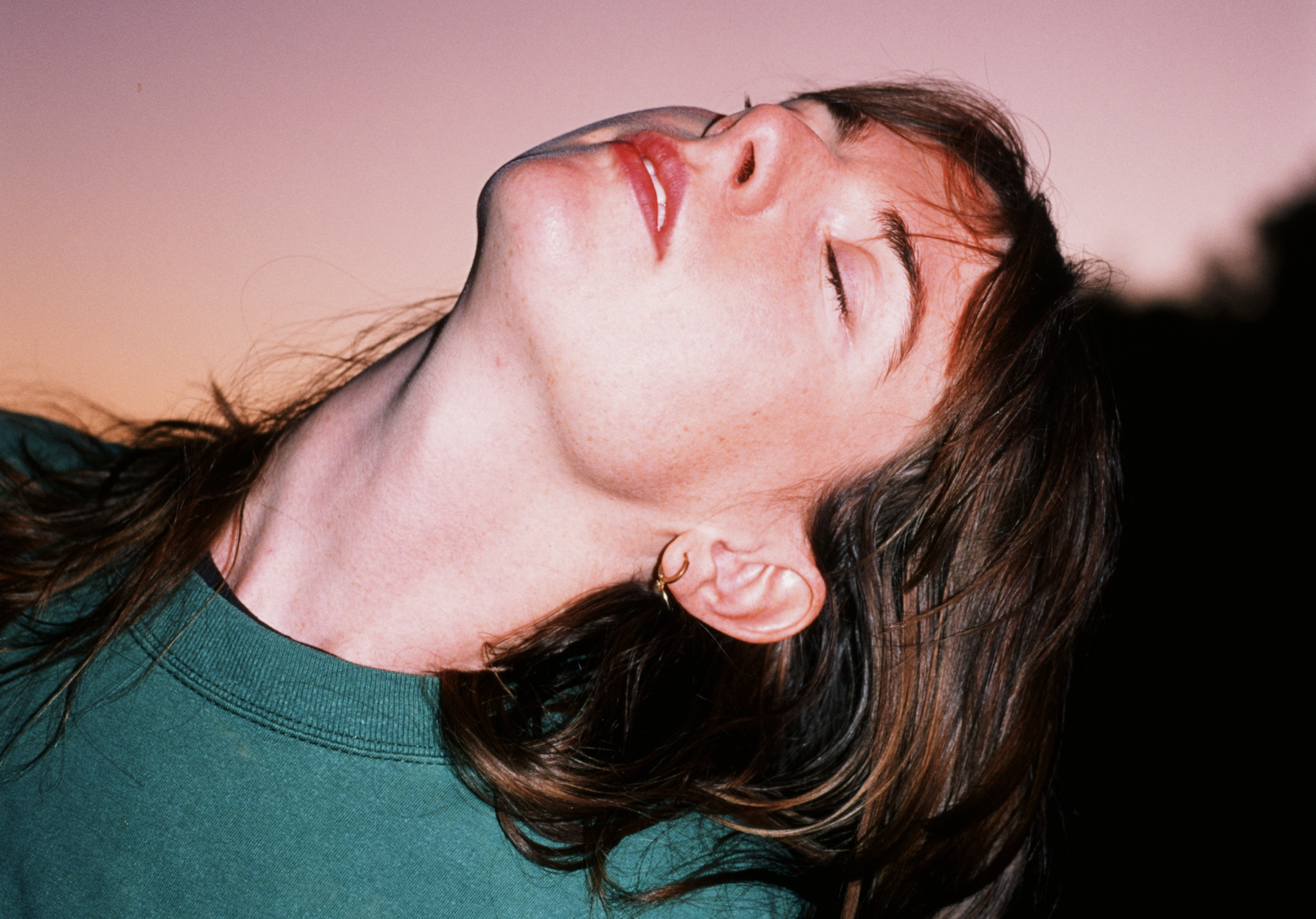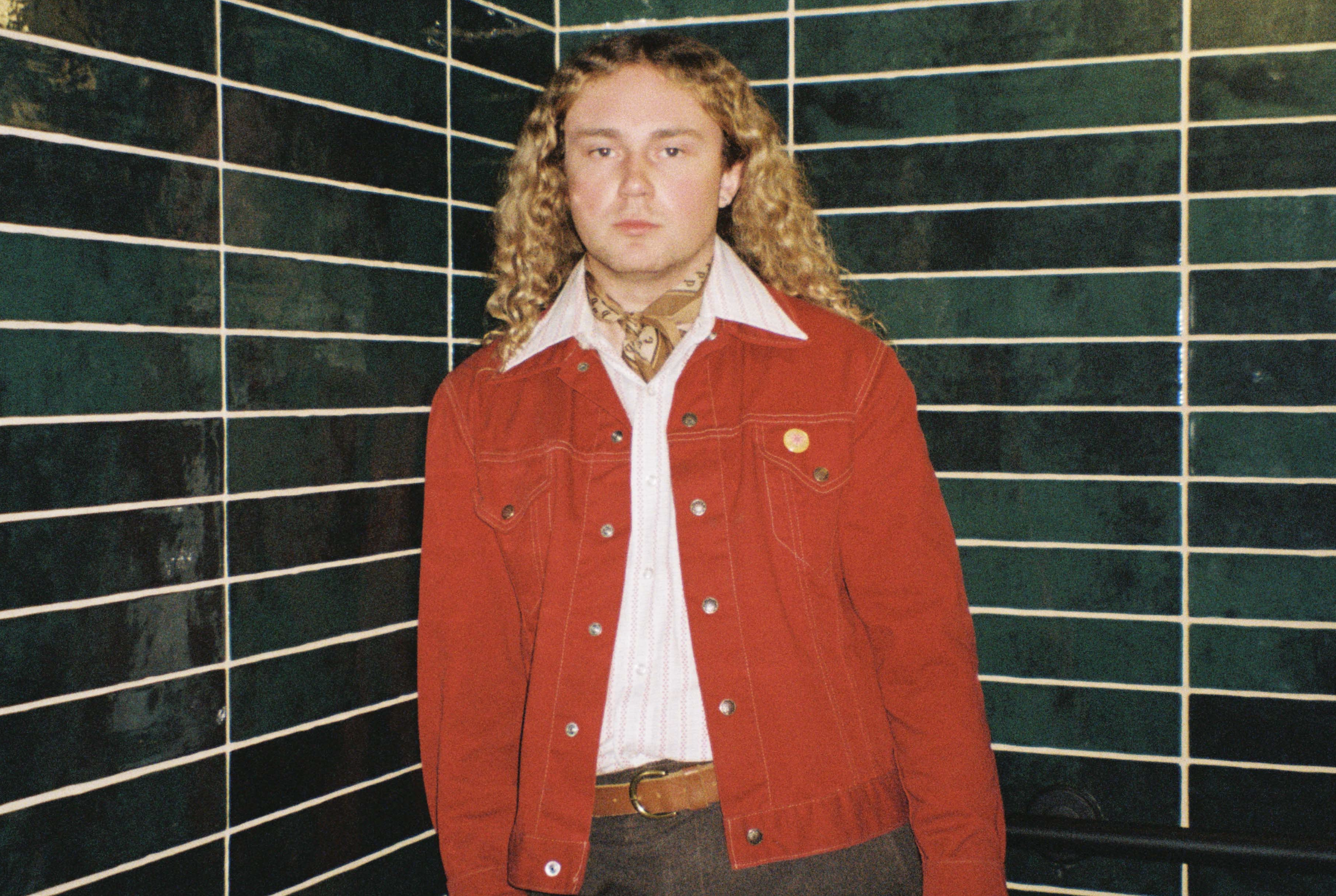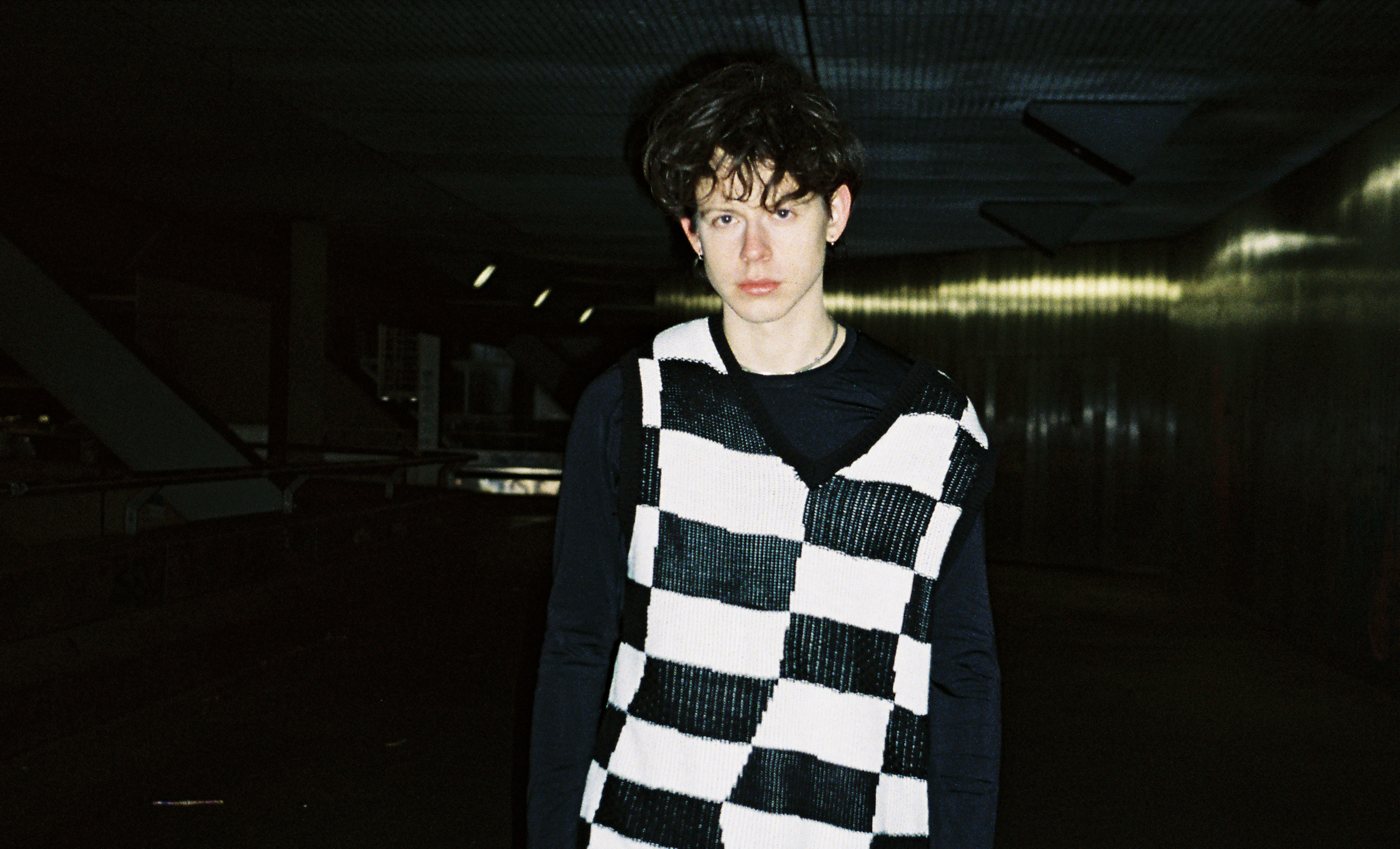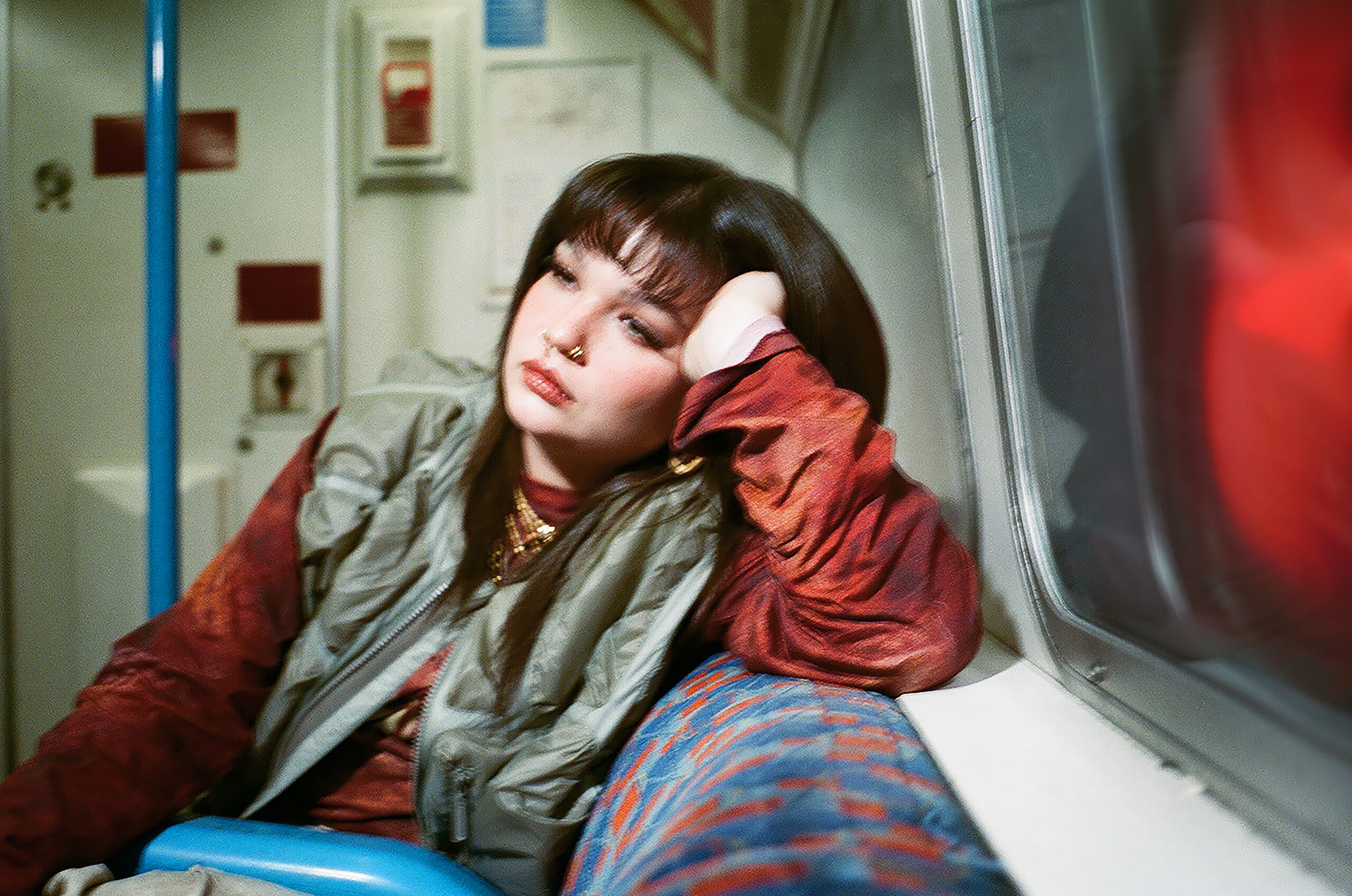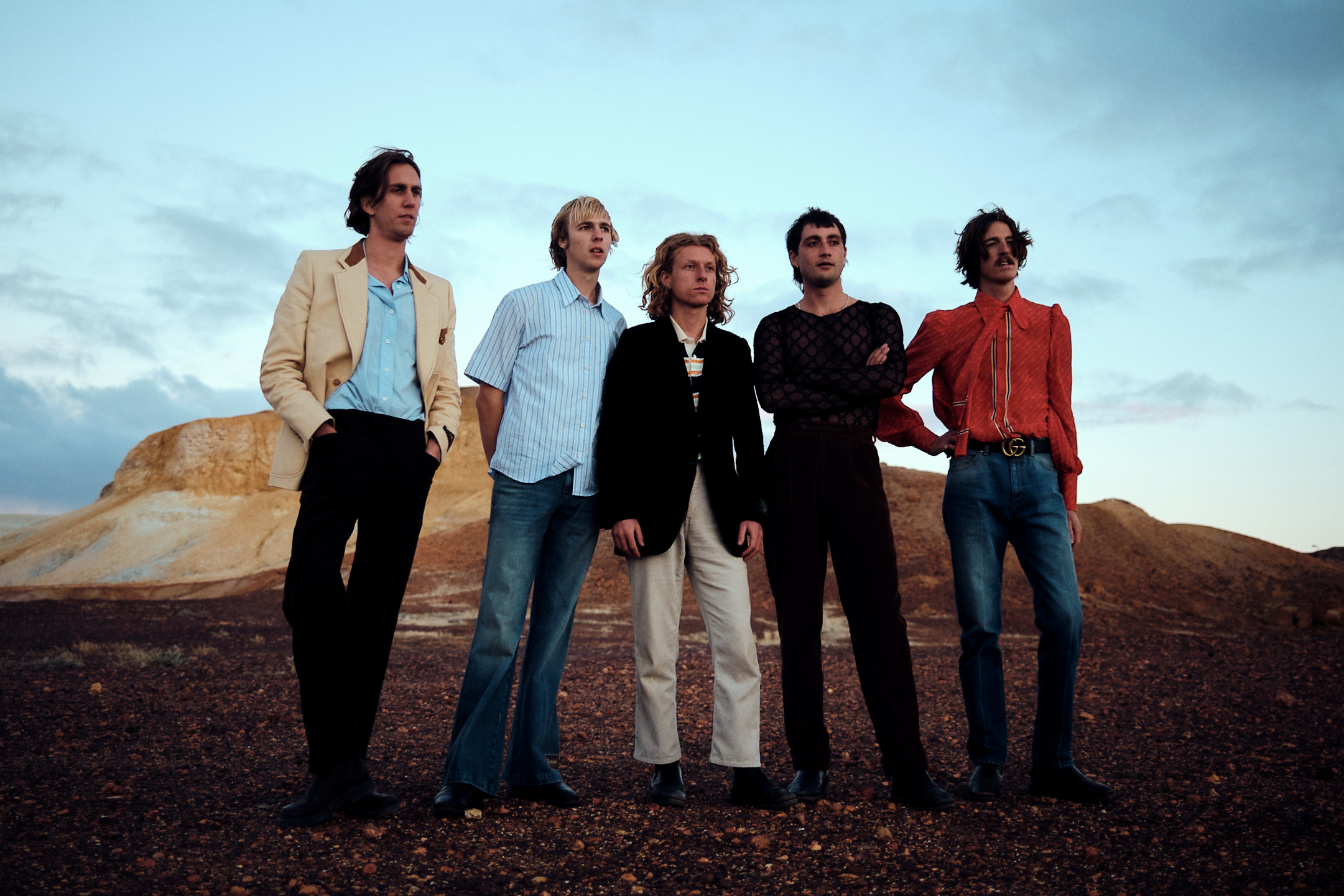Foto-© Alex Waugh
Es gibt wohl keine andere Band, die mit einem Schlag so der Indie Welt den Kopf verdreht hat. Der Name Parcels wird erwähnt und die Schwärmereien beginnen…Egal, in welchem Stadium ihrer Haarlänge und Styles (ich hatte sie damals 2016 mit langen Haaren zum ersten Mal gesehen), sie verzücken und schaffen es, dass andere Bands so klingen wollen wie die Parcels. Dass sie nicht dem australischen Surferboy Klischee entsprechen, ist nun wirklich allen klar, oder? Nun haben die Parcels ein Album veröffentlicht, eigentlich sind es viel mehr zwei Alben. Day/Night heißt das gute Stück und mit Louie, Anatole und Noah wurde sich darüber unterhalten. Und ja, auch hier spielen Bongos ein Thema…
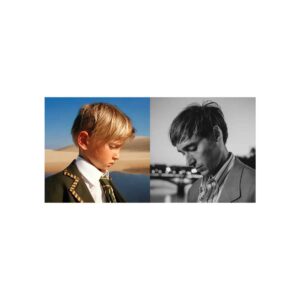 We’re sitting here and your new album is out. Before we talk about it, let’s talk about the past couple of years. I realised, some German Indie bands sound like your songs or were influenced by them. I would say, they listened a little bit too often to your music. What’s your opinion on that? Is it an honor for you?
We’re sitting here and your new album is out. Before we talk about it, let’s talk about the past couple of years. I realised, some German Indie bands sound like your songs or were influenced by them. I would say, they listened a little bit too often to your music. What’s your opinion on that? Is it an honor for you?
Noah: Do you think we’re influencing people?
I would say so, because there are so many of them. They really sound like Parcles.
Noah: Like young up and coming German Indie bands?
Yeah, and also like bigger ones.
Noah: Like The Toten Hosen?
Definitely. How do you feel about that? Do you have an opinion? Is it an honor for you?
Louie: Yeah, it’s an honor. For sure. It’s hard to take credit for it, because we’re just being influenced by much older people as well.
Noah: It’s the trickle down effect of influence. We’re taking stuff from everybody else who were inspired by and then it’s just like a pyramid of musical inspiration.
Louie: But you know, if any band references us as an influence, that’s pretty amazing..
Anatole: What would be a real compliment, like with this new record, I think our sound has changed a little bit. If we saw like a shift in the indie bands journey.
Noah: And everyone started bringing bandanas, that would be cool. Especially style wise. We can influence fashion as well.
You could start wearing dresses like Harry Styles…
Noah: That will be really close. If you’ve seen our last press pics, we’re wearing this little singlets so it’s one step away.
Another question about your past: One of your first official singles was a feature with Daft Punk. Pretty cool. Was it obvious to you after working with Daft Punk that you will someday release a double album?
Noah: I don’t think there’s a correlation.
Because these are two big things, they usually might happened after a couple of years of releasing. I mean, who can say that one of the first singles is a feature with Daft Punk? Tell me another band who has done this and then just like in a very short amount of time you release a double album, which is not very usual for bands, I would say.
Noah: For us it’s been a really long period of time between the Daft Punk feature and this moment. They’re almost not connected in any sort of way. It’s like been a really long process of slowly getting to this idea of a double album, and then actually going through with it in a way.
Anatole: I do see your point though that like, I think we like to see what’s happening with other bands and we’re like, alright, what can we do different? Like, maybe not so much with the Daft Punk thing but I think the idea to release a double record was like, fun for us because no one else is doing.

Very cool. I started listening to Day/Night and your album opener Light sounds very huge and orchestral. I was very impressed. Actually the first thought was like, is this a new Parcels sound? Because the first minute didn’t sound like your older releases. And then more and more I got that Parcels vibe and especially the guitars. I’m not sure, if I got it right. Did you use bongos?
All together: Congas
Noah: It’s the better version of bongos
Anatole: Woah… (Anmerkung, etwas Empörung machte sich breit)
Because I have this discussion with my friends, because they’re telling me that bongos are not cool. Congas and drums are cooler.
Anatole: When they come together, like the synergy. It’s like Batman and Robin.
That’s a good thing.
Noah: That’s the headline of this interview.
Actually, I asked Jungle if they had to choose between bongos and drums, what would they pick and they said drums because any drum can sound like bongos.
Anatole: It’s true.
I know it’s true, but from the coolness aspect, I would say Bongos. Just my opinion, because I don’t have any clue about instruments.
Anatole: I think it was so fun for us to play with a percussionist, and we were just in Paris doing a live session. There were two percussionists on these records, one for each record. But we got to play with one of them again. It was what’s been missing since we recorded and then we’ve been rehearsing in Berlin without a percussionist, and then to have one again, it was like, „Oh, wow.“ I realised how big a part of the record those percussionists were.
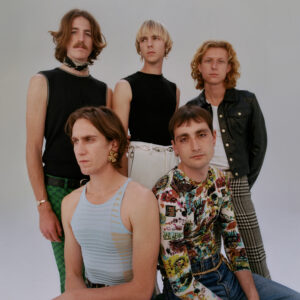
When you’re going to play live shows, there will be bongos and congas and everything on stage?
Anatole: Hopefully, yeah.
Louie: It’s really nice to play with them. Also, for the rest of the band, just the rhythm section suddenly feels like it can hold the whole show. And we can just kind of like put it on top.
Anatole: It’s so interesting, because as soon as I’m playing with a percussionist, I’m just listening more and I play less and Jules said that he was like „Oh man, like it’s so nice when there’s a percussion and then you don’t have to fill in all the gaps because there’s someone there supporting you.“ And it’s not just for me, I’m sure it’s the same with the keys. For everything. Anything rhythmic. As soon as there’s another rhythm you just want to listen. I don’t know it feels completely different.
I’m really looking forward to see and hear this in the future. So as mentioned, your new album has a day part and a night part. Did you work on those both parts at the same time?
Louie: They were recorded in the same studio but the day album was recorded upstairs in the living room of this, it was like a big old manor house with a studio actually in the basement. But you could also record in the living room upstairs. So we did the whole day album in that one room together. And it’s all live and there are mics around the room so you can hear like the space that we’re in and it’s all bright and open. And then the night album, we recorded it downstairs in like this very, like sectioned off studio. We were like isolated from each other. And that let us record it in a way that was more kind of tight but also let us go like bigger in the sound.
Anatole: What I never thought about before until right now. Is that in the living room there’s windows everywhere and there was sunshine. It was beautiful. And then in the studio there are no windows.
It was the night part.
Louie: We spent a lot of time also planning how we were going to record these albums with the idea of day and night. So we made all these decisions very early on. It all worked out. I can do the day off here, the night there, it’s gonna be no natural light during the night time. It became a bit ridiculous.
It was like not method acting, but..
All together: Method recording.
How would you describe the difference between the two parts? Maybe in three words, if it’s easy for you, or you can use more words, if you prefer.
Louie: God, three words? Well, the day is like it’s live, I guess the whole of the day, I’ve always characterized by the feeling of it being organic, I think. And then also a kind of freedom in like, how the instruments interact with each other. And really inviting. Warm.
Anatole: And lyric wise, emotive but also universal somehow. It’s like everyone can feel this, like what I’m feeling?
Noah: It’s like being outside. And instead of being inside. The world is open, it feels free. You’re walking around, and it’s warm. And it’s enjoyable, kind of more carefree.
Anatole: And it doesn’t always mean it’s happy. Like, you’re sad moments in the day as well.
Louie: But it’s pretty much honest.
Anatole: They’re both pretty honest.
Louie: So the night ones a little bit more of quite theatrical. It’s a bit more over the top, there’s a lot more thrown in, like, there’s more chords and sections and instruments. And the orchestra really takes it to its own place as well.
Noah: But it also has more extremities. It changes quite drastically sometimes. And it’s in that because it’s trying to represent the kind of turmoil of being inside yourself, the deep darkness of your mind, and how you can be like, confused and it can be just really hard to be in your own mind sometimes. And so it’s really reacting of itself.
Louie: The less inviting as a record, I think.
Anatole: And kind of egotistical. Not pleasant sometimes to listen to. I really have the night as like, these little demon guys. Like fucking look at me and then like, stay away.

That’s interesting, because when I was listening to it yesterday, it was around 6pm. And I was still in the office. And I thought, why not just start listening now and then maybe later on at home, in the beginning it was kind of dancy, but moving like you said, positive and very open. And then with the night part, I got a little bit more emotional, thoughtful, so it’s very interesting that you put so much thought in it.
Noah: That means it’s working.
You had around 150 demo tracks for the album. On the album itself are 19 tracks. How was the process of finding the right album tracks? Was it very difficult? Did you have like any criteria to make sure that this is an album track and this not?
Noah: No, I found that process super enjoyable. Because it’s amazing. It’s the very start where like creativity is at its most open, and you’re the least restricted. And you get these little gems of everybody’s songs and you’re listening back to for hours and hours. You’re listening to 150 demos and it’s an amazing glimpse into each of our minds. And the process is actually surprisingly natural in a way and when we’re going through demos when we were like beginning to actually play them as a band. The ones that everybody kind of liked, though they were just clear kind of winners and ones that were clearly in the same bracket. And you could tell that Jules, and Pat had written a song that actually belonged together that they were actually thinking about things in the same way sometimes, and it was easy to pick songs and leave others behind. Because you can see from the 150 demos, you could pick a clear message from each of it. I mean, there’s so many different ways to go. But you can put a bunch of the demos all together, and there would be a uniform thing. But it still took ages because we got it down to like 40. And then it kept going, but you just start picking the ones that all make sense together, and start writing the narrative in which that album is supposed to be.
Louie: It was hard, because some really great songs, I think some of the best songs that any of us have written. Some of them didn’t get on the album, and I just don’t know what they are anymore.
Anatole: I find it tough. There’s a couple of songs that we really tried, that everyone loved. And they didn’t work and we kept coming back to some. And for some reason, like as a demo, everyone could see the beauty in that song. Then when we played it as a band, it just wasn’t meant to be.
Noah: That works as a single person’s expression. Then when you bring all five people together, and you’re trying to play it, and it is like this not working as Parcels like that would work as Pat, or that would work for Jules or whatever that works. But it doesn’t work for five of them. There were a few frustrating moments where we just wished it could work, because you knew there was something there, but you had to let it go. And that’s a big part of the process too, is like being good at letting go.
That’s very important. I thought this must has been a hard decision deciding which of the 150 demos can make it on the album.
Noah: A bunch of bands and a bunch of fans would like to see/hear some of the demos. And I think we will never do it. But there’s a part of me that would like to let people in on that super personal place and give them the rowers thing. But otherwise, there’s no we won’t do it. Because otherwise why would we have taken this long to record this record? But it’s there, there are some gems in there.
Anatole: One of the guys from Daft Punk actually told us once it’s not about the songs that we’ve released. It’s about the songs that we didn’t release. Or something like that. I would love to hear all the songs that Daft Punk didn’t release. But then I’m like, actually I don’t. It’s so important not to hear them.
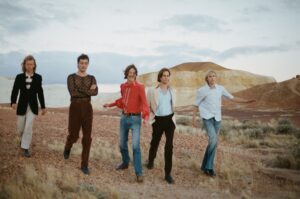
Or maybe you just save them for the very best of for the future. Maybe like in 10 years Parcels will release their very Best Of.
Noah: But these are the best of the ones that have made it to the recording.
Louie: Maybe when everyone gets like creatively stunted and no one’s writing anymore. That’s when we’ll crack back into the demos.
Your whole album sounds like a soundtrack to a film for me. That was my first impression of the album yesterday.
Noah: Did anybody tell you that? Or did you get that yourself?
Nope, got that myself. What do you think would be the plot to that soundtrack of film? And since you have two parts, what kind of film would it be?
Louie: Well, we kind of started making the album as a soundtrack to a film. And so while we were making the songs we were always thinking about, like the visual or the movie scene that was going along with it. And over the course of the album, we actually wrote the narrative or the scripts for like a few different movies and it is a story now, but the film’s not been made. So it’s it’s hard to nail it down.
Anatole: I think like excluding the music videos, because the music videos took on their own script. But for me, it’s like boy, or girl, just like a person from a child coming into adulthood. And if we took that whole life, but then made it one day, like, if someone could grow that fast in 24 hours, and they had to go through all the shit that you have to go through to get to our age, in a day, that’s the record for me. Like in between.
Noah: I see it like that, where the whole movie for me would be 24 hours, just 24 hours. And then we went through different things of like, the start is obviously a sunrise. And then during that he’s kind of in his apartment, getting ready for the day, there’s a feeling of optimism, and he exits the door and exam to the city. And then there’s coming back. And it kind of it’s like, a journey and one guy’s experience and one day. And then, there’s I don’t know what happens. But it’s like going through all the emotions of what it feels like to be a human and what it means to be in the city, but maybe craved for nature, and going to a party or going out or getting all messed up in your mind emotionally. And I mean, there’s so many different ones you can do.
Anatole: Yes, each song could be five different things.
I like that film. Coming to the last questions – there’s one thing I’m really interested in and think it’s funny. The way you write your song titles. There’s always missing the space between the letters. What is the idea behind?
Noah: I’m glad you find it funny. It’s good.
Anatole: We thought it was artistic.
Noah: It was just something that we did from from the very first demos of Parcels. And it was literally because Pat’s keyboard was broken. And then he would write like, long messages on Facebook Messenger with no spaces, because he couldn’t. And it was pretty annoying. But so all the demos were that, we get into loops of traditions. We want to be doing something once we find out how to do something else. It’s just like a tradition now.
Louie: We’re still finding new joy in it as well. I think we enjoy the idea that a few words can become a new word like that. Just the title of the song. It’s not the separate words anymore.
Noah: Like for Gamesofluck. You can rearrange the letters or the syllables in a way that’s a whole different thing.
In the beginning, I really had problems understanding and reading the titles because I didn’t get that it was English…
Anatole: I feel like it was more than the spacebar being broken. Like song Clockscared. Which is not exactly working. It’s two words, clock scared. But one word, like has such a meaning clockscared.
Louie: It was originally a clock scared, but when it’s together, you can’t separate them anymore.
Thanks a lot for your time!


